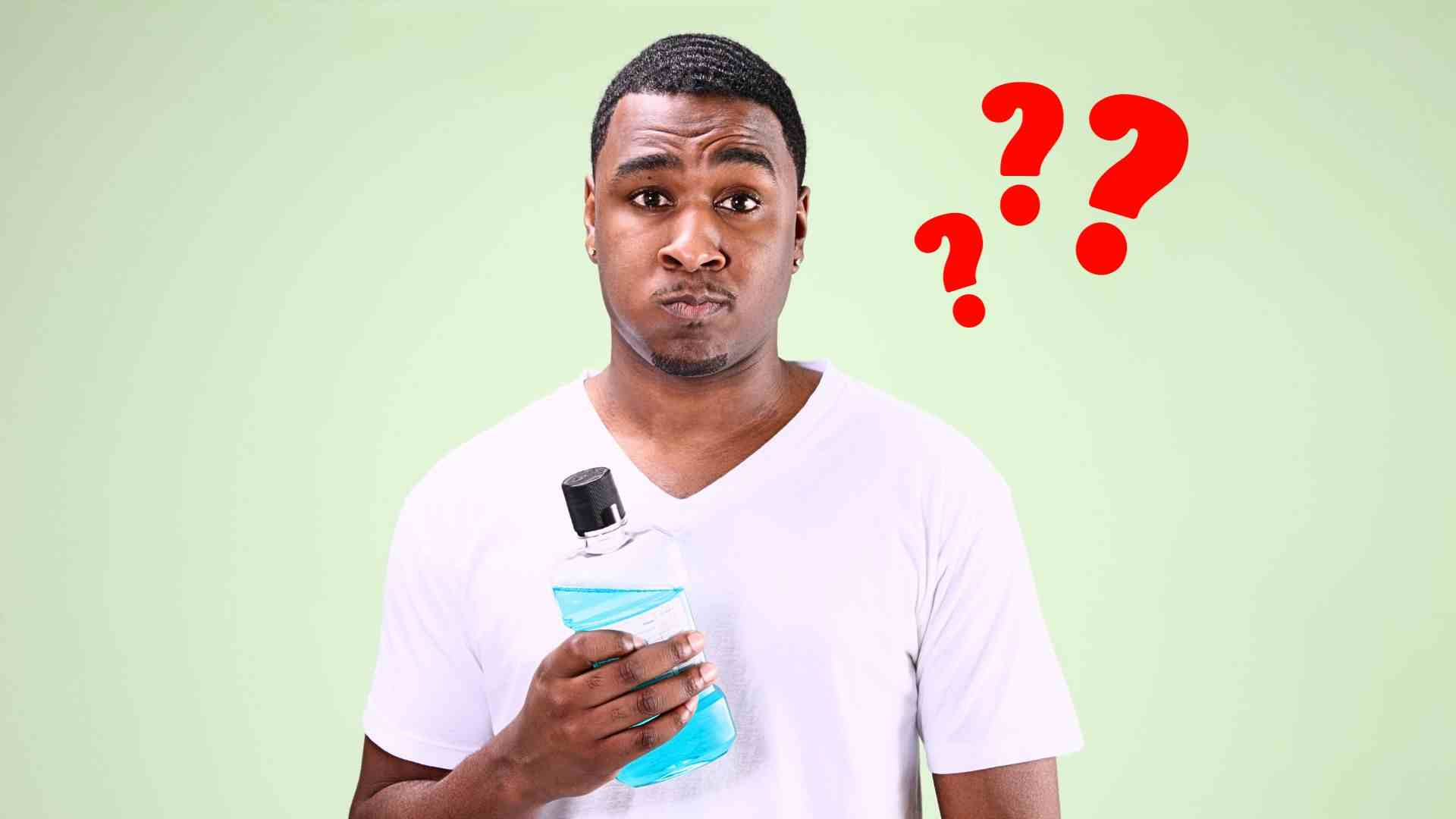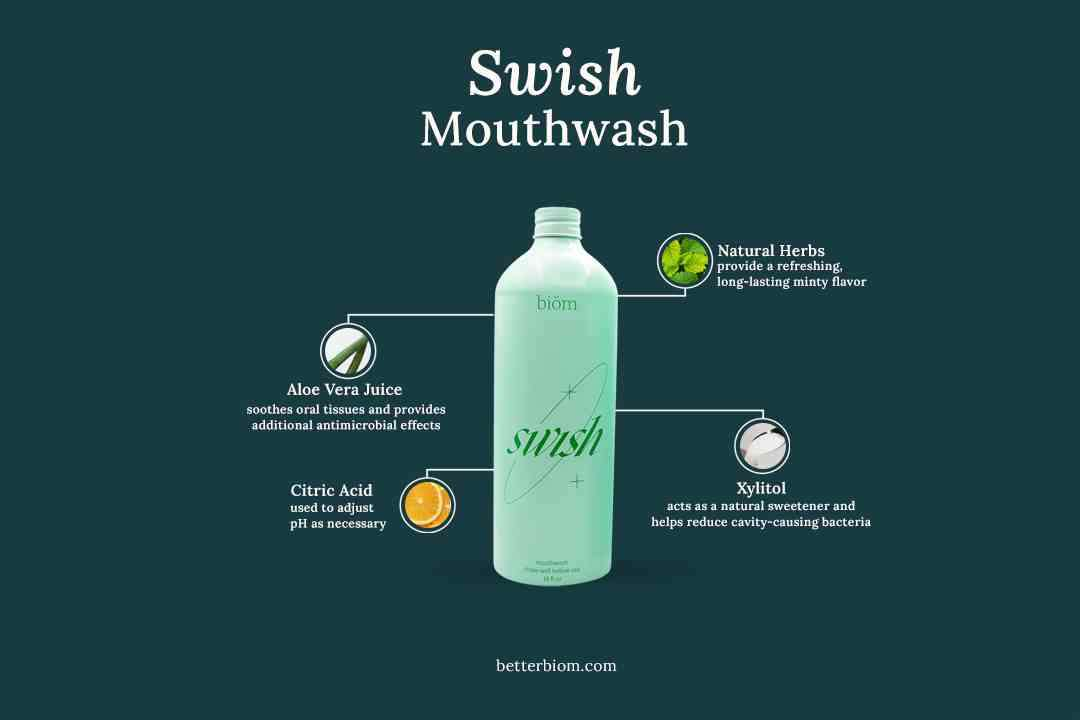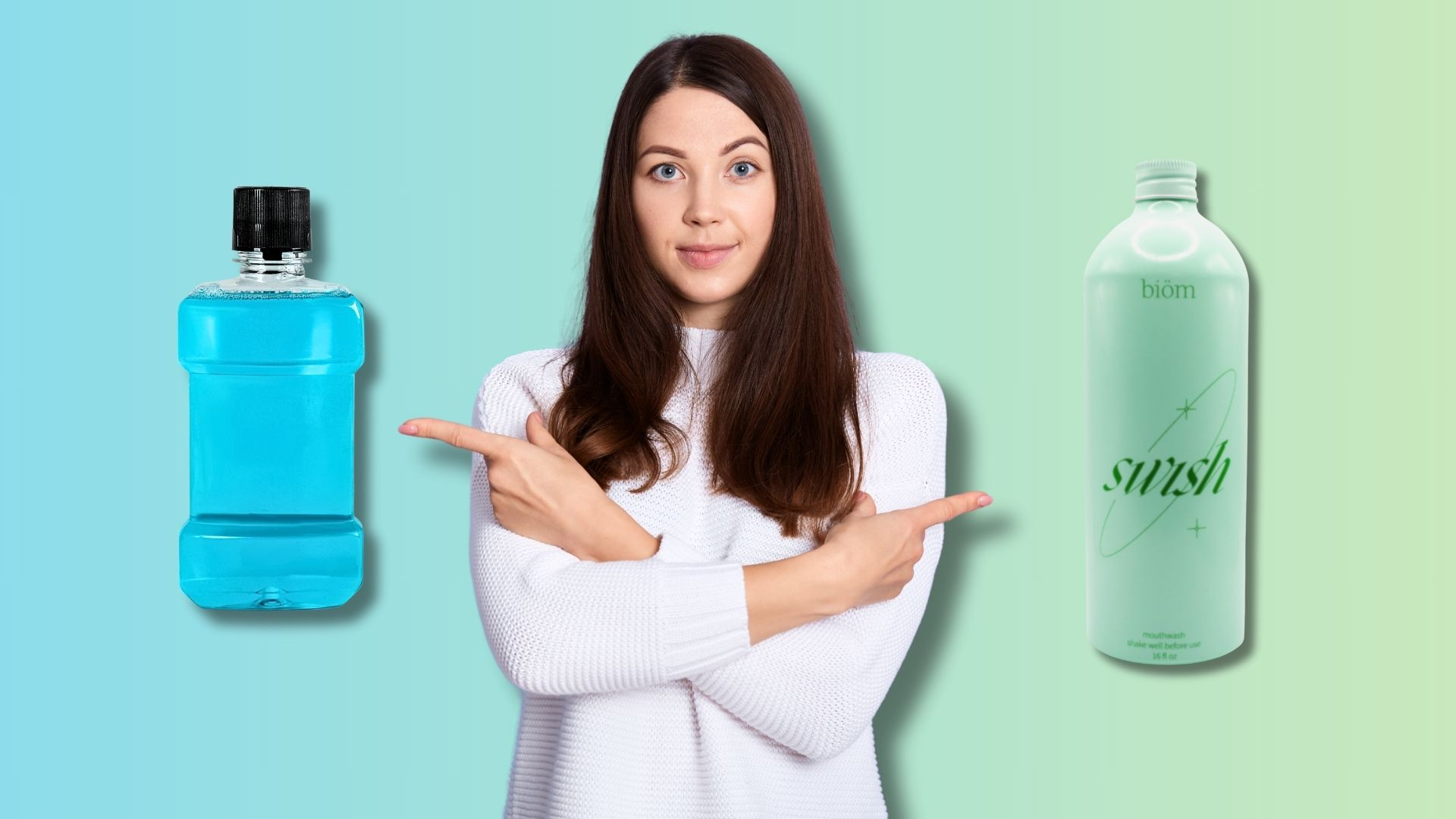Is Alcohol in Mouthwash Bad?
The presence of alcohol in mouthwash is not inherently bad, but it's essential to understand its potential impact on your oral health.
While mouthwash is beneficial for your daily oral routine, prolonged use of alcohol based may cause certain risks, such as:
-
dryness
-
irritation
-
burning sensation
-
and an increased oral cancer risk.
Ultimately, there's always a way to address these concerns and maintain good oral hygiene.
One effective solution is to consider alcohol free mouthwash as a safe and effective alternative to alcohol-based options.
Keep reading to learn everything you need to know about alcohol in mouthwash and its efficacy and safety for your oral health.
What is alcohol mouthwash?
Alcohol mouthwash, also known as alcohol-based mouthwash, is a type of mouthwash that contains ethanol as a solvent for active ingredients, antiseptic properties, and preservative properties.
Research has shown that alcohol mouthwash (ethanol) is effective at killing germs and bacteria in the mouth, which helps reduce:
-
plaque buildup
-
tooth decay
-
and bad breath.
However, studies suggest that using alcohol containing mouthwash has potential risks associated with excessive use, including the development of oral cancer, a severe health condition that has been studied with prolonged mouthwash use containing high alcohol concentrations.
Additionally, research indicates that regular alcohol consumption can destroy your oral microbiome, causing bad breath and dry mouth due to bacterial imbalance and reducing saliva production which is crucial for fighting tooth decay and gum disease.
Therefore, the potential risks of using alcohol-based mouthwash should be carefully considered, and you may want to explore alcohol free alternatives to mitigate these potential concerns.
How does alcohol mouthwash work?
Alcohol mouthwash contains ethanol which acts as an antimicrobial agent to kill bacteria and freshen breath.
The alcohol concentration in mouthwash typically ranges from 18% to 26.9% which can work effectively to reduce plaque buildup and combat gingivitis when used in addition to regular brushing and flossing.
However, excessive alcohol consumption in mouthwash can have drawbacks. For example, mouthwash can burn your tongue and dry out the oral mucosa, ultimately leading to potential oral conditions.
It is worth nothing that alcohol free mouthwash also exists and may be a better alternative for those who are sensitive to alcohol or have dry mouth.
The Benefits of Alcohol Mouthwash
While alcohol mouthwash can be too strong for the delicate tissues in your mouth, moderate use of this product can still offer advantages that contribute to optimal oral hygiene.
Here are some benefits of alcohol-based mouth rinse:
-
Ethanol is effective at killing germs and bacteria in the mouth, reducing bacterial plaque buildup, and decreasing the risk of developing tooth decay, cavities, and gum disease
-
It helps to dissolve oils in the mouth which has an antibacterial effect that reduces cavities and prevents gum disease
-
Alcohol-based mouthwash also helps keep breath feeling clean and fresh
-
Overall, rinsing with alcohol-based mouthwash improves your oral hygiene by getting in between your teeth and braces.
However, while using this alcohol-based mouthwash has an effective impact on your teeth, overexposure to these formulations may lead to the following consequences.
Are alcohol containing mouthwashes safe?
Alcohol-based mouthwashes are generally safe when used as directed and are effective at killing bacteria and reducing plaque.
However, studies have found that frequent use may cause dryness, irritation or risks of oral cancer in the mouth due to the alcohol content.
They may not be suitable for individuals with sensitive oral tissues or a history of alcohol dependence.
For those concerned about these effects, alcohol-free alternatives provide similar benefits without the potential downsides.
Potential Risk of Using Alcohol Based Mouthwash
Alcohol mouthwashes have long been associated with oral hygiene, primarily due to their potent bacteria-killing properties. However, it's essential to consider the potential risks of its use.
-
Increased Risk of Oral Cancer: Studies associate a heightened risk of developing oral cancer with regular use of alcohol-based mouthwash for individuals who consume alcohol and/or cigarettes.
-
Potential Link to Upper Airway Cancer (≥3 times/day): A systematic review indicates a significantly higher risk of upper airway cancer when using alcoholic mouthwash ≥3 times/day, compared to non-users.
-
Elevated Acetaldehyde Levels in Saliva: The alcohol strength in mouthwash correlates with higher levels of acetaldehyde in saliva, potentially increasing the risk of oral cancer.
-
Drying Effect Leading to Dry Mouth: Alcohol-based mouthwash can diminish saliva production, resulting in a drying effect and contributing to dry mouth.
-
Burning Sensation: Alcohol-based mouthwash may cause an unpleasant burning sensation in the mouth. This can be especially harmful after wisdom tooth removal.
-
Destruction of Good Bacteria: Alcohol in mouthwash can indiscriminately eliminate both beneficial and harmful bacteria, leading to an imbalance and potential complications.
-
Potential Exacerbation: Alcohol-based mouthwash has the potential to amplify the effects of ethanol, especially in cases of extreme exposure.
-
Exceeding Acceptable Ethanol Intakes (for Alcohol-Dependent Consumers): In worst-case scenarios for alcohol-dependent consumers, using alcohol-based mouthwash may surpass acceptable daily intakes of ethanol and other compounds.
To address these issues, we recommend you consider switching to a milder or alcohol free mouth rinse formulation.
Alcohol Free Mouthwash as an Alternative

Alcohol-free mouthwash can be a gentle alternative for maintaining your oral hygiene.
In fact, alcohol free mouthwash is shown by research to be equally as effective as alcohol based mouthwash at killing harmful bacteria without disrupting the good ones.
Evidence even suggests that it is more gentle and effective than containing alcohol as this can't cause any risks to your oral health.
Therefore, to avoid potential complications against the use of alcohol-based mouthwash, consider using a mouth rinse with an alkaline pH which evidence suggests can neutralize acidity. This is essential for oral health.
By neutralizing acidity in saliva production, these rinses can contribute to a healthier oral environment and may be especially beneficial for individuals prone to acid erosion or enamel sensitivity.
Alcohol Free vs. Alcohol-Based Mouthwash: Efficacy in Killing Germs
Studies show that non-alcoholic mouthwash can be just as effective at killing harmful bacteria as alcohol-based options.
Plus, it doesn't disrupt the balance of your oral microbiome which is essential for preventing issues like bad breath, dryness, or tooth decay.
Alcohol-based mouthwashes can indiscriminately kill both harmful and beneficial bacteria which can reduce saliva production and can lead to oral health problems.
Therefore, if you're looking for an effective mouthwash that fights bad breath without risking dryness, why not upgrade to alcohol free mouthwashes?
What other ingredients of mouthwash you should avoid?
Mouthwash can contain various ingredients that may not be beneficial to your oral health.
It is crucial to identify these components to avoid any adverse effects. For example, the alcohol in mouthwash may be associated with oral carcinogenesis and increase the risk of developing head and neck cancer, according to the Neck Cancer Epidemiology Consortium (INHANCE).
The alcohol content in mouthwash can also cause irritation on the oral mucosa and lead to a burning sensation.
Other components that may not be suitable for your oral health include:
-
Methyl salicylate: one study suggests that it can result in burning sensations in the mouth, digestive problems if swallowed and can be poisonous in large amounts.
-
Chlorhexidine gluconate: this is a common active ingredient in prescription mouth rinses that can cause discoloration of the teeth and affect the taste buds temporarily.
-
SLS (Sodium Lauryl Sulfate): SLS can cause oral irritation and poses potential health risks, leading to possible oral irritation and other health concerns.
-
Parabens: Linked to hormone disruption and other health concerns, potentially resulting in hormone disruption and various health issues.
-
Formaldehyde: Known as a carcinogen and skin irritant, it may cause carcinogenic effects and skin irritation.
Conversely, according to research mouthwashes with neem, licorice extracts, and essential oils are safe and effective alternatives that can provide additional benefits for your oral health, such as fresh breath and plaque-fighting effects, without any side effects that you must watch out for.
Who Should Not Use Mouthwash
Mouthwash is often considered necessary for maintaining proper oral hygiene. However, not everyone is a suitable candidate for using mouthwash.
Children below the age of six should not be using mouthwash unless under the supervision of parents or healthcare professionals and know how to spit according to the American Dental Association.
Further, if you have poor oral hygiene, gum disease, or dry mouth, using mouthwash could exacerbate these conditions and potentially lead to further complications.
Plus, individuals who have undergone radiation therapies for head or neck cancers may experience a burning sensation when using alcohol mouthwash due to their sensitive oral mucosa.
That said, if you have any of these risk factors, we recommend opting for alcohol-free mouthwash options instead. These can still provide active ingredients to help with plaque buildup and fresh breath while avoiding the potential risks associated with excessive alcohol concentration.
Do I use mouthwash before or after brushing?
In deciding when and how often to use mouthwash, the choice largely depends on your personal preferences and the desired outcome.
Let's explore the benefits of both options to help you make an informed decision.
Using Mouthwash Before Brushing
Using mouthwash before brushing is a common practice for many individuals and has advantages like:
-
Freshening breath
-
Loosening debris
-
Enhanced cleaning
However, we recommend using mouthwash after brushing for the best results.
Using Mouthwash After Brushing
Using mouthwash after brushing is also a valid choice, and it offers its own set of benefits:
-
Extended freshness
-
Continued antibacterial action
-
Reaching any spots missed by flossing and brushing
This is the method most dentists recommend.
The Importance of Good Oral Hygiene Habits
Good oral hygiene habits are essential for maintaining optimal oral health.
While non-alcohol mouthwash can improve your breath and reduce bacteria, it is essential not to skip your daily brushing with nano hydroxyapatite toothpaste, flossing, and tongue scraping routine.
These actions are vital for removing plaque, food particles, and bacteria from all surfaces of your teeth and gums, contributing to overall oral health and preventing issues like:
-
tooth decay
-
bad breath
-
canker sore
-
dry mouth
-
and gum disease
Mouthwash can complement these efforts, but it should not replace them entirely.
Additionally, we recommend using non fluoride toothpaste to avoid potential risks like dental fluorosis.
The Bottom Line: Is alcohol mouthwash bad?

No, alcohol mouthwash is not inherently bad for you; however, using it excessively may cause potential risks for your oral health.
For a safe and effective alternative, use alcohol free mouthwash together with nano hydroxyapatite toothpaste, dental floss, and a tongue scraper daily to enhance your overall health.
This combo will help you achieve healthy, clean, fresh, and pretty whites!
Frequently Asked Questions
Is mouthwash better with or without alcohol?
Research suggests that both alcohol-free and alcohol-based mouthwashes effectively reduce plaque and gingivitis. However, alcohol-free mouthwash shows comparable plaque reduction and superior gingivitis reduction without the irritation linked to alcohol-based options. Therefore, choosing alcohol-free mouthwash can offer effective oral care benefits, gentler on the gums, and avoiding potential drawbacks of alcohol-based formulas.
What is the safest mouthwash to use?
The safest mouthwash to use is typically alcohol-free. Research has shown that alcohol-free mouthwashes are effective in maintaining oral health while being gentler on the gums. It was found that alcohol-free mouthwashes offer comparable plaque reduction and superior gingivitis reduction compared to alcohol-based options, without causing irritation commonly associated with alcohol-based formulas. Therefore, choosing alcohol-free mouthwash, such as SWISH Mouthwash, can provide effective oral care benefits while being gentle and safe for daily use.
Should I Use Mouthwash Before or After Brushing?
You should use mouthwash after brushing. This sequence ensures a comprehensive oral care routine where brushing and flossing eliminate food particles and bacteria. At the same time, mouthwash provides a finishing touch, leaving the mouth healthy, clean, and fresh for an extended period. Moreover, the order of these steps is flexible—whether before or after brushing, the key is not to skip this important part of your oral care routine.
Can I drink water after mouthwash?
Generally, you should avoid drinking water after about 30 minutes to allow the mouthwash to have its full effect without being diluted. This is especially important if the mouthwash contains nano hydroxyapatite, as rinsing with water immediately after using mouthwash can wash away the ingredients and diminish its effectiveness. Therefore, it's advisable to wait at least 30 minutes before drinking water, especially after using fluoride-containing mouthwash.
How often should I use mouthwash?
Use mouthwash once or twice a day, ideally after brushing and flossing, to help reduce bacteria and freshen your breath. However, it's important not to overuse it, as excessive use can disrupt the balance of good bacteria in your mouth. Always follow the instructions on the mouthwash label and consult your dentist if you're unsure.
Should I rinse with water after mouthwash?
We recommended avoiding rinsing with water immediately after using therapeutic mouthwash. This allows the active ingredients in the mouthwash to remain in contact with your teeth and gums for a longer period, maximizing their effectiveness. However, if you're using cosmetic mouthwash, you can rinse after use because cosmetic mouthwash primarily focuses on freshening breath and providing a pleasant taste.
When should you use mouthwash?
You should use mouthwash after brushing and flossing your teeth, typically twice a day, to help reduce plaque, freshen breath, and prevent gum disease. It's best to wait about 30 minutes after brushing to avoid washing away the fluoride from your toothpaste. Mouthwash can also be used after meals if brushing isn't possible, but it shouldn't replace regular brushing and flossing.
Why is alcohol mouthwash bad?
Alcohol-based mouthwashes can be drying to the mouth, which may lead to a reduction in saliva production. This can result in an increased risk of bad breath, tooth decay, and gum disease, as saliva is essential for neutralizing acids and protecting against harmful bacteria. Additionally, some studies suggest that regular use of alcohol-based mouthwashes may irritate the oral tissues and potentially cause sensitivity. For those with dry mouth or sensitive gums, alcohol-free mouthwashes are often a better choice.
Why is mouthwash without alcohol better?
Mouthwash without alcohol is gentler on the mouth, reducing the risk of dryness and irritation. It helps maintain the natural balance of good bacteria, supporting overall oral health. Additionally, alcohol-free mouthwashes are often a better option for people with sensitive gums or those who experience a burning sensation with alcohol-based products.
Should I use mouthwash every day?
Using mouthwash every day can be beneficial for maintaining fresh breath and supporting oral hygiene. However, it's important to choose the right type of mouthwash, as some with alcohol or strong chemicals can dry out your mouth. It’s best to use alcohol mouthwash in addition to regular brushing and flossing, but not as a replacement for them.
What ingredients should I avoid in mouthwash?
Avoid alcohol in mouthwash, as it can cause dryness and irritation in the mouth, especially with frequent use. It may also not be suitable for individuals with sensitive oral tissues or certain health conditions. Opt for alcohol-free alternatives for a gentler yet effective option.
Is it bad to use mouthwash every day?
No, using mouthwash daily is safe as long as it is alcohol-free. Alcohol-free mouthwashes are gentle on the mouth and effective for maintaining oral health. Always follow the instructions and consult your dentist for the best recommendations.
Is it bad to have mouthwash with alcohol in it?
Mouthwash with alcohol can cause dryness and irritation in the mouth, especially with frequent use. It may also be too harsh for individuals with sensitive oral tissues. For those concerned, alcohol-free mouthwashes are a gentler alternative.
Does alcohol-based mouthwash disrupt the oral microbiome?
Research states that alcohol-based mouthwash can disrupt the balance of good bacteria in the oral microbiome. While it effectively kills harmful bacteria, it may also harm beneficial bacteria essential for oral health. Using alcohol-free mouthwashes can help maintain a healthy microbial balance.
What should you avoid in mouthwash?
Avoid mouthwash with alcohol, as it can dry out your mouth. Stay away from harsh chemicals like chlorhexidine for daily use since they can stain teeth. Also, avoid mouthwashes with too much fluoride as it may cause white spots on teeth, known as fluorosis. Using too much fluoride over time can weaken enamel instead of strengthening it. It’s best to choose a gentle, alcohol-free mouthwash with natural ingredients for daily use.
Is mouthwash before or after brushing?
It’s best to use mouthwash after brushing to help wash away leftover bacteria. If your mouthwash has fluoride, wait at least 30 minutes before eating or drinking. Using mouthwash before brushing can loosen plaque, but it’s not as effective as using it after.
























